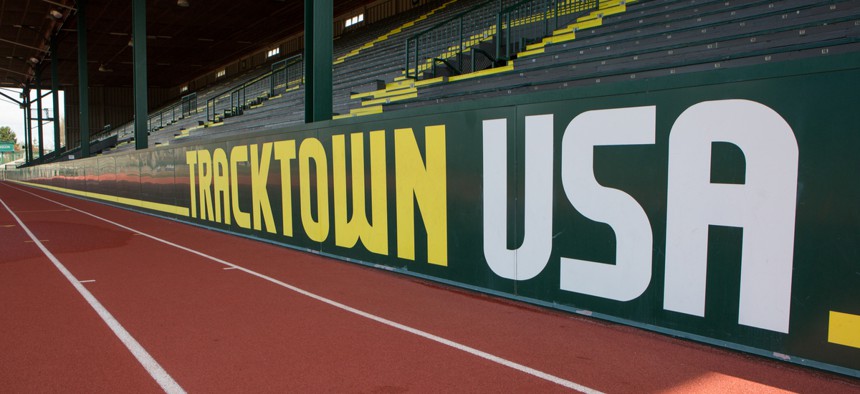How a Midsize U.S. City Is Preparing to Host One of the World’s Largest Sporting Events

Historic Hayward Field at the University of Oregon will be renovated and reconstructed to host the 2021 IAAF World Championships. Shutterstock

Connecting state and local government leaders
The IAAF track-and-field world championships are still three years away. Local officials in Eugene, Oregon may be “slightly nervous” but are embracing an “opportunity to really shine.”
PORTLAND, Ore. — When you look at the list of places that have hosted the world’s largest biennial track-and-field competition in recent years, it’s not necessarily surprising that major cities like Beijing and London have hosted such a global sporting event. Doha, the capital of the oil- and gas-rich Persian Gulf state of Qatar, will host the International Association of Athletics Associations’ World Outdoors Championships in 2019. And then coming up in 2021 will be Eugene, Oregon, a midsize college town with a fraction of the population and a far lower profile on the world stage.
“This is our chance to be put on the map,” Stephanie Scafa, the city of Eugene’s project lead on local planning efforts for the event, told a gathering of municipal professionals from across the Pacific Northwest on Friday organized by Engaging Local Government Leaders. “This is our opportunity to really shine.”
How Eugene secured the bid for the 2021 competition, which was led by the nonprofit TrackTown USA and not the city itself, has been a source of major controversy. The Oregon21 bid, as the organizing effort is known as, has faced scrutiny from the FBI since it sidestepped the IAAF’s normal selection process. But regardless of how Eugene won the bid back in 2015, the city’s planning and preparations must move forward for the 10-day competition, set for Aug. 6-15, 2021.
It will be the biggest athletic event anywhere in the world that year. Two-thousand athletes from 214 member athletic federations are expected for the competition, Scafa said. And nearly every nation in the world will be represented at the world championships. No pressure to make a good global first impression, right?
Pulling an event off like this, not surprisingly, is an effort that requires cooperation among multiple cross-sector partners. That includes Eugene’s city government, which is working closely with its state, county, university and other local stakeholders.
“We’re all really excited about the event,” Scafa said of the city government. But “we’re slightly nervous,” too, due to the size of the event and the logistics involved.

While Eugene regularly hosts track-and-field meets, including U.S. Olympic trials, the world championships are far larger than any previous athletic competition in the city. Eugene will also be the first U.S. city to host the IAAF track-and-field competition and will see its local population of roughly 165,000 residents swell.
Despite some those local jitters of being on the world stage, “we’re a few years out and it seems like we’re in a good place right now,” she said.
As the city prepares for the world championships, Scafa said Eugene is currently focused on four priorities: learning from other host cities; strengthening partnerships and coordination; building momentum on existing projects; and strategic communication.
“It’s going to take a lot of coordination with all of our partners” on the Oregon21 organizing committee, said Scafa, who previously led the city’s solid waste program.
The city won’t be building any new facilities but the University of Oregon is reconstructing Hayward Field—a track with a storied history in the world of track and field competition—and preparing three areas of campus for athlete housing. “We have a really solid town-gown relationship,” Scarfa said of the city’s interactions with the university.
Since the event is a statewide event, Scafa used the ELGL event to welcome other local governments in Oregon to think about how they might be able to join the effort, especially when it comes to help identify local tracks in their communities that could be used by athletic federations as practice facilities.
While Eugene’s city government isn’t responsible for building new infrastructure to host the event, leaders at City Hall are using the competition as a “catalyst” for other projects, Scafa said, including a mixed-use development adjacent to downtown that features a former city steam plant. The riverfront site will be adjacent to a 1.3-mile long park.
The city also has a tree-planting effort—2,021 new trees by 2021—and community mural projects underway, too.
Hosting the 2021 championships, Scafa said, gives the city a solid deadline take those plans and make them happen.
“It’s a really interesting time in Eugene,” Scafa said.
Michael Grass is Executive Editor of Government Executive’s Route Fifty and is based in Seattle.

NEXT STORY: A DNA Database With 2% of The Population Can Be Used to Find Almost Anyone





